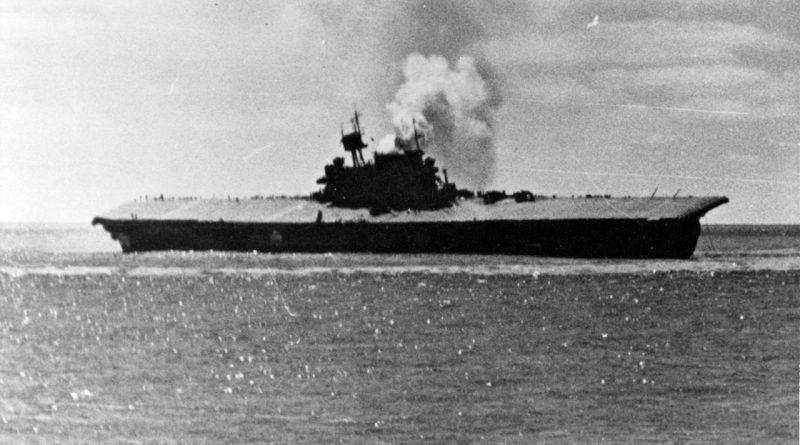June 4 in U.S. military history
1919: U.S. Marines land in Costa Rica to protect American interests when the government is overthrown by a coup.
1934: USS Ranger (CV-4), the first U.S. ship designed from the keel-up as an aircraft carrier, is commissioned at Norfolk, Va. While she is too slow for service in the Pacific Theater, Ranger participated in the Operation TORCH landings in North Africa and attacked German shipping off the coast of Norway during Operation LEADER.
1942: During the great naval battle of Midway, a wave of TBM Devastator torpedo bombers attacks the Japanese carriers, their decks full of planes re-arming for another strike against the U.S. Naval base. While the ships’ guns and fighter planes are focused on the Devastators – which are wiped out nearly to a man – American SBD Dauntless dive bombers hammer the flattops from above. The bombs and strafing runs cause massive destruction and by the end of the day, four of the six aircraft carriers that attacked Pearl Harbor just six months ago are now headed for the bottom of the Pacific Ocean.
(Featured image) A Japanese counter-attack mortally wounds the American carrier USS Yorktown (CV-5), which is abandoned and later finished off by a Japanese sub. The Battle of Midway becomes the high-water mark for the Japanese navy. After “the most stunning and decisive blow in the history of naval warfare,” the United States switches to the offensive and doesn’t look back.
Hundreds of pilots and sailors receive the Distinguished Service Cross and the Navy Cross (the second-highest awards for valor) but surprisingly only one will receive the Medal of Honor during Midway: Capt. Richard E. Fleming. When his squadron commander is shot down, Fleming takes over and drops his Vought SB2U Vindicator dive bomber to just 400 feet before releasing his bomb on an enemy warship. Despite 179 holes from enemy fighter and anti-aircraft artillery bullets in his plane collected during his dive, he escapes with minor injuries. He and his gunner, Pvt. 1st Class George A Toms are lost the next day when their plane is set on fire and crashes into the ocean while diving again to a perilously low altitude. Toms is awarded the Distinguished Flying Cross.
1944: A U.S. hunter-killer task force intercepts the German submarine U-505 off the Cape Verde islands. The destroyer escorts hammer the sub with depth charges and anti-submarine mortars, forcing the U-boat to surface. After taking additional fire from automatic weapons and aircraft from the escort carrier USS Guadalcanal (CVE-60), skipper Harald Lange orders the crew to abandon the sub.

The task force picks the German sailors out of the water while a nine-man boarding party led by Lt. Albert L. David climbs down the hatch of the enemy sub, prepared to fight it out with a hostile crew and facing the possibility that the ship could explode any moment. Fortunately, they find the sub empty and are able to disarm the demolition charges while they capture the Enigma machine and its code books and save the sub from sinking. David is awarded the Medal of Honor for “the first successful boarding and capture of an enemy man-of-war on the high seas by the United States Navy since 1815.”
Meanwhile in Europe, the Caesar Line protecting Rome has fallen. Although Field Marshall Albert Kesselring’s Tenth and Fourteenth Armies are in danger of encirclement as they fall back to the next line of defense, U.S. Lt. Gen. Mark W. Clark chooses to capture a now-undefended Rome – the first European capital to be liberated by the Allies.
1953: During the Battle of Pork Chop Hill, Private Charles H. Barker of the 17th Infantry Regiment and his fellow soldiers discover a group of Chinese soldiers digging emplacements on the side of the hill. The Americans lay down a base of fire while the outpost sends men to flank the enemy. A major firefight erupts, and when Barker and his men begin running low on ammunition, the soldiers have to withdraw back to their defensive lines. Barker volunteers to remain behind to cover his fellow soldiers and is last seen engaging in hand-to-hand combat with the communists. Barker is posthumously awarded the Medal of Honor.
